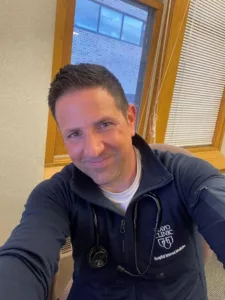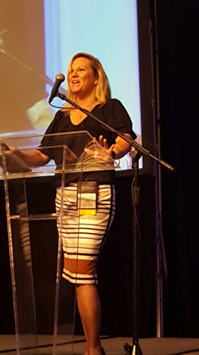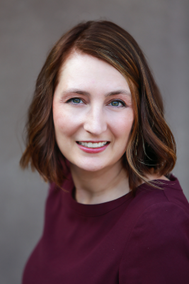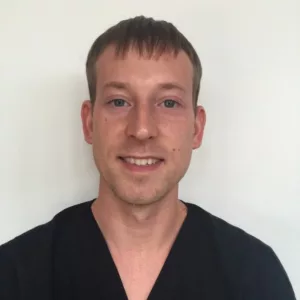Hear from Past AAPA Presenters for Benefits and Tips on Presenting at AAPA 2024
‘I will forever be grateful to AAPA for giving me a chance to speak.’
July 25, 2023
We asked seven past presenters to share their knowledge about the benefits of presenting at an AAPA conference. Here is what they said:
As an advocate for professional growth and knowledge exchange, what compelling reasons would you offer to inspire fellow professionals to submit their proposals for AAPA 2024?
AAPA conferences are opportunities for PAs to showcase their clinical or non-clinical expertise and improve their knowledge and speaking skills. “Getting an instant, in-person reaction from a broad audience of PAs is incredibly valuable and, frankly, a lot of fun,” says Harrison Reed, MMSc, PA-C.

Ji Chun, MPAS, PA-C, BC-ADM, agrees and states, “It will also push you to enhance your knowledge beyond what you have gathered so far while you are preparing for the presentation.”
[Submit your application to present at AAPA 2024!]
PAs Sarah Bolander, DMSc, PA-C, DFAAPA, and Nguyen Park, DMSc, PA-C, DFAAPA, emphasize the impact of presenting on a national stage and how it has the means to inspire change in the healthcare system and advance the PA profession. “Each PA offers a unique perspective based on individualized experiences, and having a fellow professional share this is invaluable for growth for our profession,” Park says. “It contributes to our body of knowledge, increases our expertise, and makes us more valuable members of every team.”
In your opinion, what distinguishes a standout proposal that is more likely to be accepted for presentation at AAPA 2024?
Many presenters agree that having a unique or fun twist on a common topic or case study can help set you apart from the pack. As much as PAs attend conferences to learn, they also want to be engaged. Put yourself in the audience’s shoes and think about what you would most like to learn.

Andy Herber, PA-C, favors “submissions that are case-based presentations with audience response questions to ensure that the crowd remains engaged.” Bolander agrees and says, “Standout proposals have creative titles with well-articulated session descriptions that communicate the value of your topic. Topics should be timely and relevant to your audience with a clear engagement strategy.”
“The PA profession is spread across the entire landscape of medicine,” Reed adds, “but presentations still need to be focused enough to offer real value in a short, hour-long timeslot. A good proposal combines broad appeal with a focused, digestible topic.”
What advice would you give to first-time presenters to help them feel more confident and prepared for their session?
“Confidence can be built with good preparation,” Chun says. “Put in the work as much as you can but also remember; no one can know all. It’s okay to admit that you don’t know the answer to a question. Audiences often appreciate that more.”

PAs Herber and Bafuma also emphasize the importance of making eye contact and focusing on telling a story or setting up a clinical case, instead of reading from slides. “People want to be educated, but also engaged. Have fun presenting and encourage the crowd to as well. Humor and enthusiasm always enhances learning,” Herber says.
Another way to feel more confident and prepared, according to Park, is to apply to be a grader, which will offer PAs the ability to review a wide variety of presentations and give them examples of what works and what doesn’t. “I would also practice giving the presentation to your peers to assist with timing and for any additional feedback. One way to do this is to record yourself in the slide presentation program, then replay it back to hear yourself speaking which can be revealing,” Park says.
[Become a grader and submit your application today!]
If this is your first-time submitting a proposal to AAPA, select a topic you are passionate about and seek out mentorship early. “A mentor can guide you through the process of becoming a national presenter and may be willing to collaborate with you on your first presentation,” says Bolander. AAPA offers formal mentorship through the New to the Stage submission. This unique opportunity supports new speakers by matching them with seasoned conference presenters. If you have never presented nationally, consider initially speaking locally or at a state or regional conference to gain experience and refine your topic.

Can you share any memorable moments from past AAPA conferences that have left a lasting impact on you and your work?
Reed was very nervous to present at AAPA in New Orleans in 2018. It was the first time he publicly spoke about bullying and toxic workplaces, which can be a controversial topic and one that many organizations are hesitant to engage in. The overwhelming support he received from attendees blew him away. “It started me on a path of writing, speaking, and research on this topic that I have continued to this day.”
Jennifer Carlquist, PA-C reached her crowning moment when she got to speak to her first crowd of over 1,300 PAs. “I know that number because the room capacity was that and people were spilling out of the door to listen!”
How do you approach crafting a presentation that effectively communicates complex concepts to a diverse audience with varying levels of expertise?
“Creating a balanced presentation for an audience at AAPA can be challenging,” Bolander explains. “Attendees will have diverse backgrounds with various clinical experiences. Your topic should be general enough to engage primary care practitioners while also providing pearls for the experts in the audience.”

“Since our national conference needs to appeal to a wide audience from PA students to highly experienced PAs working in specialty care,” Park adds, “as a speaker, you are able to identify what level of expertise and what fields of medicine would be covered in your presentation. A presentation that is too highly specialized will appeal only to a very narrow audience, and thus is unlikely to be accepted. We do offer a few specialty tracks, based on AAPA’s health priorities and feedback from previous conferences. Reviewing past conference presentations on the AAPA On Demand in Learning Central is another way to help create presentations that have a wide appeal.”
PAs Reed and Chun believe that going back to the basics and keeping it simple is almost always the way to go. “Real experts can break a topic down into its most basic parts,” Reed emphasizes. “For any topic, I decide what the two or three most basic and essential elements are. Then I determine the logical starting place for someone who knows nothing about the topic. If you take the material in small bites, you can usually lead any audience from a novice to an expert level of depth in less than an hour.”

In your experience, how has presenting at AAPA conferences influenced your professional growth and opened up new opportunities in your field?
“I’ve frequently found that presenting has provided unique topics of conversation during the interview process when job hunting. While I truly enjoy teaching, presenting allows me to give back on topics I’m passionate about,” Bafuma says. “It also forces you to become even more of a subject matter expert by diving deep into the literature – often making you a better clinician in the process. Chatting with other speakers and like-minded people to open up future research and teaching opportunities is a great perk, plus I believe mentorship matters and the ability to bring others up alongside (and eventually pass) me is immensely rewarding.”

After several years of presenting at AAPA conferences in various topics in his field, Chun was invited to lead AAPA’s education advisory board on diabetes. “It absolutely was a great task for me to collaborate with my colleagues across the country in forming education and delivering contents at various state chapter meetings.”
Reed insists that presenting at national conferences like AAPA is an essential part of building and demonstrating professional expertise. “Presenting at AAPA has opened the door to new public speaking opportunities, national leadership roles, research collaboration, and even full-time employment opportunities.”
Carlquist couldn’t agree more. “I will forever be grateful to AAPA for giving me a chance to speak.”
You May Also Like
Calling All Applications for AAPA 2024!
AAPA 2024 Call for Presentations
AAPA 2024 Call for Presentation Graders
Thank you for reading AAPA’s News Central
You have 2 articles left this month. Create a free account to read more stories, or become a member for more access to exclusive benefits! Already have an account? Log in.



